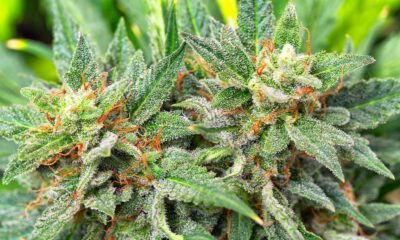
Joint Opinions
San Francisco’s ‘Marijuana Awareness’ Campaign Has a Truthiness Problem
Activists blast the “Truth or Nah” campaign for spreading dishonestly.
Of all the choices available to today’s young people, those walking, talking bad-decision machines dripping with excess hormones, smoking marijuana definitely isn’t the best one.
But it’s probably wiser than sexting, playing the knock-out game or cyberbullying — though maybe less trendy. According to the most recent government survey, roughly the same amount of high school students smoke marijuana as do cigarettes, and teen marijuana use has remained remarkably steady over the past five years. This suggests legalization (and its hefty prices) hasn’t changed youth habits much.
That’s good and bad. If you were to ask an honest health professional, they would probably say that of the two smokable plants, cannabis is the safer choice. This would be largely due to the fact that marijuana use is not connected to long-term lung damage and, according to the National Academies of Science, Engineering, and Medicine, has proven medical benefits.
But you would not know any this based off of a “public awareness campaign” launched by the San Francisco Department of Public Health in October.
Truth or Nah?!: Are edibles safer than smoking or vaping weed?
Find the right answer here: https://t.co/SyQSkLPFQp pic.twitter.com/OCyvTx8q2l— SFDPH (@SF_DPH) November 28, 2018
Aimed squarely at the snapback-wearing, skateboard-toting, multicultural kids of stock art fame, SFDPH’s “Truth (or Nah?!)” campaign is on buses and on the internet, and seeks to provide teens with “factual information” and “right answers,” as Nicole Elliott, the director of the city’s Office of Cannabis, tweeted.
“Myths about weed passed around in schools and online can make getting real, honest answers difficult for teens,” the campaign’s website says. “The information included here is shared with the intent to reduce the negative consequences associated with cannabis consumption for young people.”
It’s not clear what negative consequences the website is referring to, but the problem, according to local cannabis activists, is that “Truth (or nah?!)” does not do that. Instead, it spreads prohibition-style misinformation, including a bizarre claim that cannabis is as damaging to lung health as tobacco and can “poison” people.
In an e-mailed statement, Veronica Vien, an SFDPH spokeswoman, said that the $150,000 campaign was developed by “our maternal and child experts, substance use experts, our health officer, and expert consultants.”
While Vien did not identify these experts or disclose whether they were paid or volunteers, she did point to the National Academies of Science, Engineering and Medicine’s landmark 2017 literature review as source material. Interestingly enough, that review was considered a watershed moment at the time of its release because of its embrace of marijuana as a valid medical treatment.
What it wasn’t associated with was the conclusion that marijuana legalization has been problematic for young people.
Let’s take a look at few examples raised by the SFDPH’s campaign.
“Are edibles safer than smoking or vaping weed?” one ad asks. “Naaaaah!” it answers itself. “People sometimes eat enough to get poisoned before they feel any effects.”
According to Merriam-Webster, “poison” is “a substance that through its chemical action usually kills, injures, or impairs an organism.” While cannabis can certainly impair, it has never been known to kill, and its ability to injure is debatable at best.
In the ad’s defense, Vien seemed to take a softer and more nuanced stance than the ads. “We worked directly with youth,” she wrote in her e-mail. “We understand that edibles are a big risk. If not used with care, it can be easy to over-ingest cannabis.”
“Although the technical term of poison may not be commonly used, the over-ingestion of cannabis can potentially lead to negative effects such as impaired coordination, extreme anxiety, or illness.”
That did not satisfy marijuana activists, who said the use of “poison” is a deliberate and inherent falsehood. “That is a total lie,” said David Goldman, a San Francisco-based marijuana activist and president of the city’s Brownie Mary Democratic Club, a pro-cannabis registered political group. “It’s factually wrong. That is not supported by any evidence.”
“Like cigarettes, smoking cannabis can damage your lungs,” another ad says. “If consumed by teens and those in their early 20s, cannabis can also affect brain development. Potential for accidental poisoning via cannabis edibles is high, and weed has an even more negative effect when mixed with other substances such as alcohol or tobacco.”
There’s a lot to unpack here for anyone, much less an impressionable teen, but we’ll try. First, there are the long-term studies, including one conducted by the University of California San Francisco, that have found marijuana is less damaging to lungs than tobacco. This raises the question as to why the SF Department of Public Health felt the need to make such a comparison.
It’s also not clear that cannabis affects brain development or, if it does, by how much. While it’s true that young cannabis users often score lower outcomes on health or cognitive-ability studies, as Scientific American points out, it’s very difficult to control for other factors like poverty, abuse, neglect and trauma. To say outright that it affects brain development is probably true, but in what way? And to what degree? Those are questions neither scientists nor “Truth (or Nah?!)” can yet answer.
In her e-mail, Vien again seemed to soft-pedal. She brought up heavy marijuana use’s connection to chronic bronchitis, but also noted there is “no evidence of permanent damage or lung cancer from smoking cannabis.” Was that very important detail included in the ad campaign? Well, nah.
Goldman outlined these and other problems with the taxpayer-funded ad campaign in a letter to SFDPH but has yet to hear back.
The central issue here may not be that SFPDH is stretching the truth in order to demonize marijuana, but that they are stretching the truth to a skeptical population whose bullsh*t sensors are already set on high.
As Scientific American wrote, “exaggerating the perils of cannabis — the risks of brain damage, addiction, psychosis — has not helped. Any whiff of Reefer Madness-hyperbole is perfectly calibrated to trigger an adolescent’s instinctive skepticism for whatever an adult suggests.”
It’s a good idea to present teens with clear and concise facts, without embellishment, dumbing-down, or trying oh-so-hard to be cool and relevant, right? True, very true.
Is this San Francisco-bred marijuana scare campaign hitting the mark? No, it is not — no matter how many extra A’s you want to put in Nah.
TELL US, how do you talk to the teens in your life about cannabis?


























